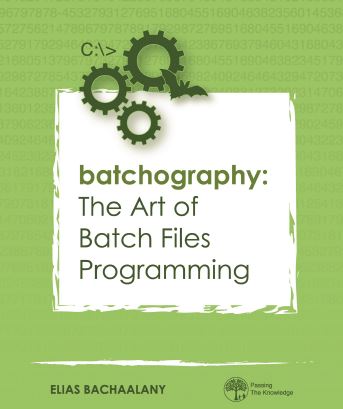In this article, I share with you a simple C++ class that wraps the string tokenization function strtok(). The QuickTokenizer class makes it easy to tokenize and enumerate the tokens in a thread-safe manner.
The class code
//////////////////////////////////////////////////////////////////////////
class QuickTokenizer
{
private:
char *buf;
char *token;
char *ctx;
void FreeBuffers()
{
if (this->token != NULL)
{
free(this->token);
this->token = NULL;
}
if (this->buf != NULL)
{
free(this->buf);
this->buf = NULL;
}
}
public:
QuickTokenizer() : buf(NULL), token(NULL)
{
}
const char *Tokenize(
const char *str,
const char *tok)
{
this->buf = _strdup(str);
this->token = _strdup(tok);
return strtok_s(buf, token, &ctx);
}
const char *NextToken()
{
return strtok_s(NULL, token, &ctx);
}
~QuickTokenizer()
{
FreeBuffers();
}
};
![]()
 Do you want to master Batch Files programming? Look no further, the Batchography is the right book for you.
Do you want to master Batch Files programming? Look no further, the Batchography is the right book for you.
Available in print or e-book editions from Amazon.
![]()
Explanation and usage example
- Unlike strtok(), this class takes a copy of the string to be tokenized and thus the source string is a “const char*” instead of “char *”
- The class uses the safe version of strtok() which is strtok_s(). This allows you to do thread-safe tokenization
- Using the C++ destructor, you don’t have to worry about memory allocation / deallocation
Example
The following example, tokenizes a semi-colon separated string and iterates over each token:
void test()
{
char *in_str = "a;b;c;d;e;f;g;h";
QuickTokenizer qt;
for (const char *t = qt.Tokenize(in_str, ";"); t != NULL; t = qt.NextToken())
{
printf("token is: %s\n", t);
}
}
![]()
You might also like:
